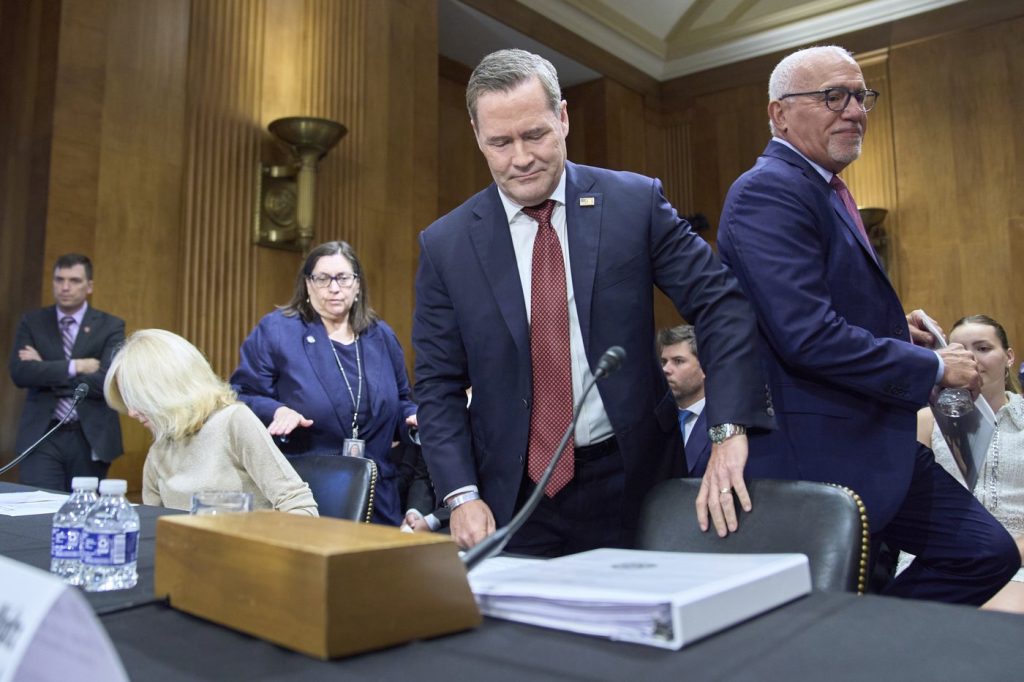As Mike Waltz, President Donald Trump's nominee for U.S. ambassador to the United Nations, prepares to appear before the Senate Foreign Relations Committee for his confirmation hearing, attention is drawn back to his departure as national security adviser, a topic that has been dubbed "Signalgate." Waltz's brief tenure in Trump's administration raised eyebrows after it was revealed that he mistakenly added journalist Jeffrey Goldberg from The Atlantic to a private Signal chat, a platform used to discuss sensitive military plans, including operations against Houthi militants in Yemen.
The fallout was immediate, with calls for Defense Secretary Pete Hegseth's removal and criticism aimed at the Trump administration for allegedly failing to hold accountable those involved in discussing military strike plans via Signal. After enduring weeks of scrutiny, Waltz left his national security role but was quickly nominated for the U.N. position. The controversy has left lingering questions about potential federal law violations, whether classified information was shared via the commercial messaging app, and if any individuals would face repercussions.
What We Know: Signal is an app designed for encrypted communication, but it remains vulnerable to hacking. Notably, on March 14, the Defense Department warned its personnel about Signal's security weaknesses, especially concerning Russian attempts to infiltrate the app. One significant vulnerability allows unauthorized access if someone can manipulate another person's device, enabling them to remotely monitor messages.
What We Don't Know: Uncertainty lingers regarding how frequently the administration and the Defense Department utilize Signal for sensitive discussions and whether those involved in the chat were using unauthorized personal devices for sending or receiving messages. In 2023, the Defense Department issued guidance limiting what information could be shared on unapproved systems, yet specifics about enforcement remain unclear.
What We Know: Under the Presidential Records Act, the government is required to archive planning discussions. However, it is unknown whether anyone in the chat stored messages as mandated. The channels created within Signal were noted to have settings that erase messages after one week, potentially complicating compliance with archival requirements.
What We Don't Know: There are ongoing questions about whether members of the group archived the messages correctly and how security protocols were maintained. Hegseth utilized an internet connection that circumvented standard Pentagon security protocols to operate Signal on a personal computer, raising concerns about the exposure of sensitive information.
What We Know: The chat group contained 18 members, including key Trump advisers such as Hegseth, Secretary of State Marco Rubio, and CIA Director John Ratcliffe, alongside Jeffrey Goldberg from The Atlantic. The National Security Council confirmed the authenticity of the text chain. However, the method by which Goldberg was added remains a mystery, with Waltz describing it as an error.
What We Don't Know: In critical moments before U.S. strikes, Hegseth disclosed details regarding timing, targets, and weaponry within the chat. The classification of this information is ambiguous; while Gabbard, Ratcliffe, and Hegseth affirmed it was unclassified, Democratic critics expressed skepticism.
What We Know: Hegseth has strongly denied that "war plans" were shared through Signal, although officials noted that even subsets of information can pose risks by potentially revealing strategic details to adversaries. Sharing specifics about operations in this manner represents a significant breach of established protocols, posing threats to U.S. military personnel.
What We Don't Know: The extent of the Signal group’s overall information sharing remains uncertain, as well as whether others affiliated with the incident will face consequences. Hegseth has since tightened restrictions on leaks within the Defense Department, implying a commitment to safeguarding sensitive information.
What We Know: In April, Dan Caldwell, an adviser to Hegseth who was involved in the Signal chat, was placed on administrative leave pending an investigation into unauthorized disclosures. This move highlights the administration's attempt to mitigate fallout from the situation.
What We Don't Know: Questions linger about the potential ramifications for Hegseth and others as inquiries continue. The Pentagon's inspector general has begun investigating the use of Signal to determine if any messages were deleted to conceal sensitive information from investigators.











